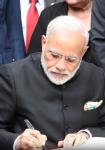The supreme commander of the frontline Hizbul Mujahideen and the chief of the Muzaffarabad-based United Jehad Council, Syed Sallahuddin, has watered down the possibility of a ceasefire during the fasting month of Ramadhan.
He said the offer will be considered only if it is made cogently from responsible quarters of the Indian government.
In an interview with a local daily, Syed Sallahuddin said, "No option of ceasefire is under our consideration at the moment. However, if there is any proposal from the Indian government, it would be discussed in the UJC forum and the decision in this regard would be taken collectively by taking all parties into confidence.
"There should be no talks on petty issues like Baghlihar or Wullar Barrage, rather there should be focused negotiations between all the principled parties of the dispute to get the issue settled amicably," he said.
Dismissing bilateral dialogue between India and Pakistan as futile, he said, "Both India and Pakistan had been engaged in talks since long and no concrete results could be achieved."
The possibility of a ceasefire between the security forces and the militant groups in Kashmir during the holy month of Ramadhan had become a hot topic here in the wake of an earlier interview given by Syed Sallahuddin in which it he spoke of the ceasefire during the holy fasting month beginning next week.
Mainstream politicians like Omar Abdullah, the president of the National Conference, has also issued statement seeking a ceasefire between the deployed troops and the separatist militants during Ramadhan.
It must be recalled that in July 2002, the then Hizbul Mujahideen operational commander, Abdul Majid Dar had announced a unilateral ceasefire which was later withdrawn by Syed Sallahuddin who made the withdrawal announcement from Muzaffarabad that time.
Senior Congress leader and the state Health Minister Mangat Ram Sharma have, however, said the ceasefire was not being considered by the state government as the increased incidents of infiltration this year indicated the intentions of the militants to increase violence in the hinterland.
The two countries are maintaining a bilateral ceasefire along the Line of Control and international border since November 2003 which has benefited thousands of border villagers on both sides.





